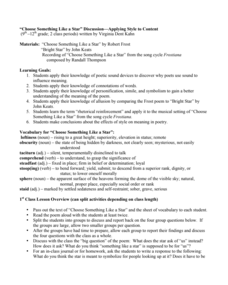Creative Learning Exchange
Lesson Plans From The Lorax
When it comes to the environment, no variable is constant. Class members graph behavior over time for the thneeds produced over truffula trees chopped down over the course of Dr. Seuss's The Lorax.
Robert Frost Farm
“Choose Something Like a Star” Discussion—Applying Style to Content
Robert Frost's "Choose Something Like a Star" and John Keats' "Bright Star" provide the text for a two-part instructional activity in which class members analyze the effects of style on meaning in poetry. Randall Thompson's song cycle...
University of Iowa
Every Atom: Walt Whitman’s “Song of Myself”
Discussion questions for Walt Whitman's "Son of Myself" ask class members to reflect on the beauty that can be found in labor, the sense of identity that transcends divisions, and on the many riddles in Whitman's poem. ...
Water
Global Water Supply Elementary School Curriculum
Water is the focus of an interdisciplinary unit that brings awareness to its daily use around the world and the importance of conservation. Worksheets challenge scholars to match words and definitions, trace, complete a maze, and solve a...
Study Ladder
Halloween Activities: Grades K-2nd
If your class is looking for word problems, reading excerpts, grammar games, and fun trivia in their trick-or-treat bags, they'll find it all and more with a Halloween-themed set of worksheets! Three pages of holiday exercises are a...
Study Ladder
Halloween Activities: Grades 3rd-6th
Planning Halloween curriculum doesn't have to be scary! Check out a set of worksheets that include reading excerpts, word problems, grammar activities, and engaging Halloween trivia that is perfect for your October lesson planning.
PBS
How to Teach Your Students about Fake News
What media literacy skills do people need to evaluate a news source? Scholars listen to and discuss an NPR story about how fake headlines often dupe young people and adults alike. Next, they study news stories, using a fact-checking...
Water
Global Water Supply High School Curriculum
Some areas of the world take water for granted while others are in crisis. So what to do? Learners consider the water crisis situation in several countries. They compare and contrast each location and the causes and effects of the water...
McGill University
Emotional Regulation
A unit of 10 scripted lessons is designed to help learners develop awareness of their emotions and of positive coping strategies they can use to regulate their emotions. They also learn how to replace negative strategies like self-blame...
McGill University
Peer Relationships
A nine-lesson unit introduces learners to strategies they need to develop healthy peer relationships. The scripted lessons focus on the etiquette of two-way conversations, sharing and turn-taking, good sportsmanship, and the...
McGill University
Independent Learning
A 10-lesson unit focuses on the importance of homework, how to set up a homework space and schedule, and strategies that aid homework completion. Also included is a list of things learners can do to help them stay focused on their...
National Science Teaching Association
Why Do We All Have to Stay Home?
Learners, especially young ones, might be confused about why or frustrated that we have to stay at home. Help answer questions and calm emotions with a nine-page resource that details topics regarding the COVID-19 pandemic.
Angel Island Immigration Station Foundation
Leaving Home Forever: What Would You Put In Your Suitcase?
Scholars put themselves in an immigrant's shoes to decide what items they would take on their journey to a new home. Learners read primary sources, take part in a whole-class discussion, and make a list that they share with their peers,...
Angel Island Immigration Station Foundation
Exclusion "Act"ivity
Two simulations highlight the feelings individuals experienced when immigrating to Angel Island. During the first simulation, scholars listen to and answer questions, divided based on their answers. The second simulation pins learners as...
Angel Island Immigration Station Foundation
The Chinese Exclusion Act
As part of a study of Angel Island Immigration Station, young historians examine the Chinese Exclusion Act of 1882, the first restriction on the United States immigration based on race and nationality. They complete a matrix identifying...
Angel Island Immigration Station Foundation
Where Is Angel Island? An Introductory Geography Lesson
Prepare young historians for a study of Angel Island Immigration Station with a lesson examining primary and secondary source materials, maps, and websites. Using what they have learned, individuals create a map of Angel Island, labeling...
Angel Island Immigration Station Foundation
Conditions in China: Why Might One Leave Home Forever?
Primary source texts provide scholars with the background information they need to understand why Chinese peasant farmers were driven to emigrate. After underlining keywords, phrases, and/or lines in the texts, individuals craft a...
Angel Island Immigration Station Foundation
Film Screening: Carved in Silence
Director Felicia Lowe's film Carved in Silence splices together re-enactments, interviews, and actual film footage to tell Angel Island Immigration Station's story. Viewers use a film matrix to record new information they learned from...
Angel Island Immigration Station Foundation
Interview a Family or Community Member: Taking Oral Histories
Young scholars gain insight into how historians record events by engaging in an oral history project. In preparation, class members brainstorm open-ended interview questions and take part in and debrief a mock interview simulation....
Angel Island Immigration Station Foundation
Interrogation of Immigrant
Imagine being interrogated by someone you don't know about minute details of your life. Imagine that the interrogator is matching your responses to the answers of other family members. Imagine how you would feel knowing that the...
Angel Island Immigration Station Foundation
Exploring Oral Histories of Angel Island Immigrants
Empowered by the previous lesson where they interviewed a family or community member, young historians examine Angel Island immigrants' oral histories. They use a matrix to record their interpretation of the feelings of the immigrant....
Angel Island Immigration Station Foundation
Immigration Case File Investigation
Case files for Angel Island immigrants are kept at the regional archives in San Bruno, California. Groups study one such case file to understand the life histories and different experiences of the internees and then report out their...
Angel Island Immigration Station Foundation
Moving to the Poems of Angel Island
A poem carved on Angel Island's walls is the guiding text of a lesson that challenges scholars to put movement into a written piece of art. After warm up-activities, learners play a game of "Pass the Clap" and "Pass the Line," in which...
Angel Island Immigration Station Foundation
How Do Pictures Tell the Story of Angel Island?
Young historians learn more about the history of Angel Island Immigration Station through their analysis of primary source images. Guided by a list of inferential questions, scholars learn how to make and record observations on a...
Other popular searches
- Understanding Statics
- Vectors and Statics
- Statics Engineering
- Math Statics
- Comprehension Statics
- Statics and Probability























